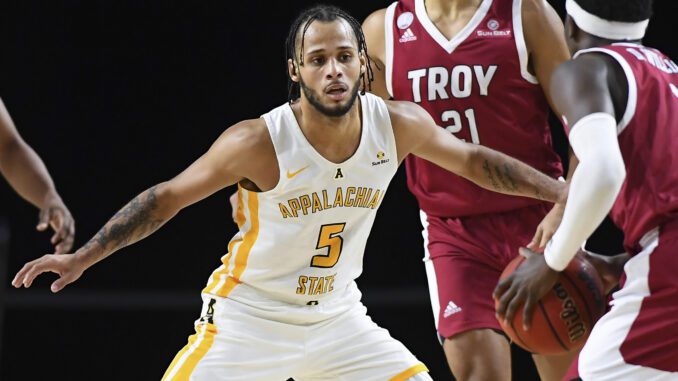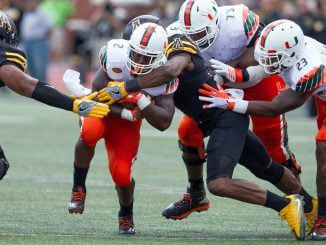
Dustin Kerns came into this season hoping to build on the momentum he created by leading Appalachian State to its first winning record since 2011 in his first year with the team.
And in at least one respect, he’s succeeded.
The Mountaineers, despite a recent two-week COVID-19 related pause, appear poised to put together their second straight over-.500 finish.
But when it comes to changing the culture surrounding his program, especially as it relates to things such as community support and creating a true home-court advantage, the progress has come in baby steps rather than giant leaps because of the coronavirus pandemic.
“I think last year set the tone and kind of flushed out a lot of the losing,” Kerns said. “There are still parts of that transition going on, but I think that good days add up. So I think we’re on the right track.
“Last year we set an attendance record and there was a lot of momentum from our fan base as well, and I feel like we’ve lost that a little bit with this season and the interruptions. I still think people are excited because we’re, quote, winning right now. But I think if we could have carried over into a normal year, we could have built on it even more.”
As focused as he is on the big picture, Kerns’ primary concern now is getting the current season back on track after a COVID pause that shut his team down for the better part of three weeks.
It’s a problem hardly unique to the Mountaineers. Virtually every team in the country has had its schedule altered in some way by the virus. But for a building program like App State, the disruption couldn’t have come at a worse time.
The Mountaineers were riding high at 12-6 (6-2 Sun Belt Conference) in late January before losing back-to-back games at Troy just before being hit by four positive COVID cases and the subsequent contact tracing.
The team lost its first two games back last weekend, both by two points to a South Alabama team currently second in the Sun Belt standings. On Saturday, it went the final 4½ minutes without a field goal to let a six-point lead slip away.
While Kerns suggested that those results might have been different had his team’s conditioning not been affected by the long layoff, he came away encouraged heading into Tuesday’s makeup game at Georgia State — an 85-71 loss.
“We went 14 days without touching a basketball,” Kerns said. “There’s no excuses, but there’s a rhythm aspect to it, a conditioning aspect. Overall, I thought to have back-to-back games, one possession that can go either way, (things went) pretty well.”
To help the Mountaineers get through their difficult situation, Kerns sought out the advice of other coaches whose teams had been through similar pauses.
Rather than jumping right back into game preparation, Kerns and his staff held a mini-camp for the first two days of the restart, concentrating on things such as fundamentals and working to get the players’ legs back.
As unnatural as that might have seemed at a time of the season in which teams are usually gearing up for a postseason run, anything on the court was better than the inactivity that preceded it.
“I was sitting at home last week just watching basketball at night and my wife goes, ‘This is weird because you’re never home this time of year,’” Kerns said. “I don’t want to say we had nothing to do. But we didn’t know who we were playing next, games were getting canceled. There’s no playbook for it.”
If it was strange for the coach, imagine what the pause was like for the players — especially an upperclassman whose remaining time in college was already growing preciously short.
“Two weeks in the middle of the season, that’s unheard of,” said graduate point guard Michael Almonacy, who along with senior shooting guard Justin Forrest serves as one of the team’s leaders. In addition to being the Mountaineers’ top assist man with 57, Almonacy is one of six team members averaging better than nine points per game.
“During quarantine, we did Zoom lifts and some cardio things to try and stay in shape,” he said. “It was hard, but now we’ve just got to refocus and try to get back into what we were doing before.”
If Almonacy and his teammates can accomplish that goal, their coach believes the inconvenient shutdown could turn into an advantage once the Sun Belt Conference Tournament begins in Pensacola, Florida, on March 5.
“I told the kids that we were going to treat this like the NBA All-Star break,” Kerns said. “They’ve got players going away on vacation during that time. They literally take it off and get recharged. So we decided to try to take this to our advantage.
“Late January, early February are the dog days of the season, and there are teams out there that are wearing down. Now we’ve got rest. Our guys are really excited about playing again while some teams are starting to get tired of it.”



